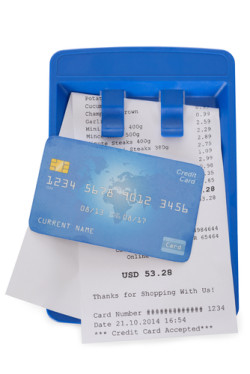 As many consumers in America are aware, debit or credit card numbers can be vital pieces of information for fraudsters to collect.
As many consumers in America are aware, debit or credit card numbers can be vital pieces of information for fraudsters to collect.
The numbers on debit or credit cards not only hold the account information, but they can also give the fraudsters direct access into the consumer’s money and other personal information resulting in credit card fraud or identity theft.
To combat this, there are numerous protections in place for consumers to reduce their chances of becoming victim to these circumstances. One of these measures if the Fair and Accurate Credit Transactions Act (FACTA), which revolves around the printed numbers on debit and credit card receipts.
This law is designed to prevent a fraudster from being able to connect vital pieces of information, which could be potentially gathered from debit or credit card receipts. Passed by the United States Congress in 2003, FACTA is an amendment to the Fair Credit Reporting Act that is meant to help reduce the chances of identity theft.
The FACTA Act requires merchants to hide or omit a certain amount of the card’s numbers and expiration date shown on a receipt, only allowing the last five numbers to be seen.
This process, called truncation, is meant to reduce the amount of information shown on debit or credit card receipts to protect the consumer from potential fraud and identity theft. At this time FACTA applies to all electronically printed debit or credit card receipts from: cash registers, self service kiosks, and restaurants.
Overview of FACTA Policy and Compliance
FACTA also allows customers to request and obtain a free credit report once every twelve months, from one of three nationwide consumer credit reporting companies: Equifax, Experian, and TransUnion.
This allows consumers to place fraud alerts on credit activities and history if fraud or identity theft is expected, and also mandates the secure disposal of the consumer’s information.
In the cases where an old fashioned machine used by small businesses who cannot afford to get new cash registers of FACTA standard, consumers are encouraged not to get a receipt period.
However, in the cases of hand written receipts that copy and paste the debit or credit card numbers are higher risk because consumers will have no knowledge or control over what happens to this information thereafter. Overall, experts advise that if the cash registers are not properly updated to report the merchants for FACTA violations and just pay with cash.
Any electronically printed receipts that show more than the last five numbers and expiration dates of the debit or credit cards, are not in compliance of FACTA and could be fined up to$1,000 per violations.
Consumers who notice that there are excess numbers on their debit or credit card receipts, may be eligible to file a FACTA lawsuit against the merchant for failing to protect their information. Potential claimants should contact a specialized lawyer, to determine if they are eligible to file a lawsuit.
Free FACTA Class Action Lawsuit Investigation
If you made one or more purchases and the retailer provided you with a receipt that contained more than the last five digits of your credit or debit card number or the expiration date, you may be eligible for a free class action lawsuit investigation and to pursue compensation for these FACTA violations.
ATTORNEY ADVERTISING
Top Class Actions is a Proud Member of the American Bar Association
LEGAL INFORMATION IS NOT LEGAL ADVICE
Top Class Actions Legal Statement
©2008 – 2025 Top Class Actions® LLC
Various Trademarks held by their respective owners
This website is not intended for viewing or usage by European Union citizens.














